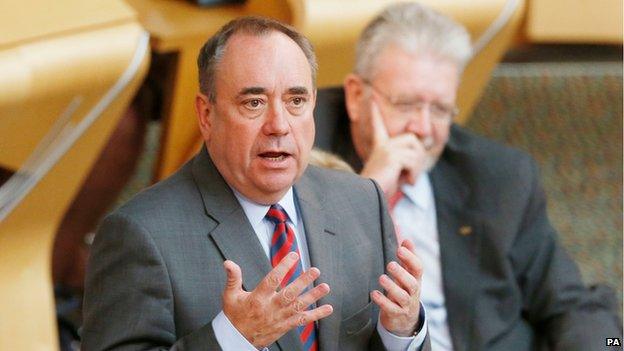Ed Miliband tells Labour: 'Our country nearly broke up'
- Published
Ed Miliband says Team Scotland "helped save our country"
Politicians have "a responsibility to try and explain" why 45% of voters in Scotland backed independence, Labour leader Ed Miliband has said.
Mr Miliband told the Labour conference the UK "nearly broke up" and that people voting in the referendum wanted to improve their lives.
He claimed the idea of working together won the referendum, adding: "Together we can build a better future."
He also said the referendum voting age of 16 should be extended to elections.
The Scottish independence referendum was open to registered voters over 16 but the minimum voting age for elections is 18.
Scotland's First Minister Alex Salmond has also called for the voting age to be lowered to 16.
In his keynote speech to Labour's annual conference in Manchester, Mr Miliband said: "Our country nearly broke up. A country that nearly splits apart is not one in good health."
He thanked senior Scottish Labour politicians who "helped save our country", including Gordon Brown, Alistair Darling, Johann Lamont and Jim Murphy.
But he argued: "All of us have a responsibility to try and explain why 45% of people voted 'Yes' to break up our country."
'Election question'
The Labour leader said he met a Scottish voter who complained about low wages in her workplace.
He said: "I don't know how she voted, but I do know the question she was asking: 'Is anything going to make life better for me and my family?'
"I hear Josephine's question everywhere, not just in Scotland. 'Can anyone build a better future for the working people of Britain?'
"It wasn't just the referendum question. It is the general election question."
He claimed that the idea of "together" won the referendum for the pro-Union side.
"Together we can build a better future for the working people of Britain," he added.

Alistair Darling, who led the pro-Union Better Together campaign, addressed the conference on Monday
In a speech to Scottish delegates on Monday evening, Mr Miliband said promises made over more powers for Holyrood would be "honoured."
The three main parties pledged more devolution during the campaign to encourage Scots to reject independence, which they ultimately did by 55% to 45% last Thursday.
Devolution row
There has been disagreement, however, on whether increased powers for the Scottish Parliament should be accompanied by changes in the role of Scottish MPs at Westminster, preventing them from voting on laws which affect England only.
In his leader's speech, Mr Miliband attacked David Cameron, who said after the referendum result that he wanted English MPs to decide England-only laws at the same time as power is devolved to Scotland.
"If David Cameron cares so much about the Union, why is he seeking to divide us?" the Labour leader asked.
"He's learning the wrong lessons from Scotland."
Mr Miliband proposed "devolving power to local government, bringing power closer to people right across England", adding: "It's got to be led by the people. It can't be a Westminster stitch-up.
"That's why we need a proper constitutional convention."
And he said he wanted to reform the House of Lords, creating "a senate of the nations and regions".

Tim Reid, BBC Scotland's political correspondent
At the party's conference in Manchester, Mr Miliband claimed that a future Labour government would create the more fair and just society that both "Yes" and "No" voters called for in the independence referendum.
At the annual Scottish reception on Monday evening, the Labour leader praised those who helped keep Scotland in the union.
He won the loudest applause when he mentioned Mr Brown's role during the final weeks of the campaign.
In a swipe aimed at his political opponents, he said: "Let no one set England, Wales and Scotland against each other because we have just spent the last two years keeping our UK together and we are not going to stand for it."

Labour's deputy leader, Harriet Harman told BBC Radio's Good Morning Scotland that the promised new powers for Scotland would be delivered.
"It was an absolute promise that was made and it's a promise that has absolutely got to be delivered," Ms Harman said.
"If you make a promise on the eve of an election and you say: if you vote 'No' you will get more powers devolved, then that is absolutely what's going to happen."
Her comments came after shadow chancellor Ed Balls said Labour would not vote for a "rushed" constitutional settlement that "would not work" in the wake of the Scottish referendum.
Ms Harman added: "There will be some changes further on down the line in relation to England, but that makes no difference to what was promised to Scotland and what will be delivered to Scotland."

Alex Salmond said the referendum debate had "energised" politics in Scotland
Mr Salmond made a statement to the Scottish Parliament on the same day as Mr Miliband's Manchester speech, in which he claimed that "people have been energised, enthused by politics in a way which has never happened before" during the referendum campaign.
"As a result of that, our great national debate in my estimation will help us make a fairer, more prosperous and more democratic country - and in all of that, all of Scotland will emerge as the winner," he told MSPs.